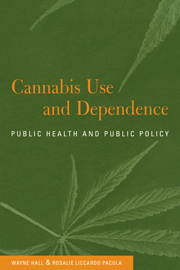Book contents
- Frontmatter
- Dedication
- Contents
- List of figures and tables
- Foreword
- Acknowledgements
- 1 Introduction
- Section 1 Cannabis the drug and how it is used
- Section 2 The health effects of cannabis
- Section 3 The psychological effects of chronic cannabis use
- Section 4 Effects on adolescent development
- Section 5 Harms and benefits of cannabis use
- Section 6 The effectiveness and costs of cannabis prohibition
- 14 The impact of prohibition on cannabis use
- 15 The monetary cost of enforcing prohibition
- 16 Other costs of cannabis prohibition
- Section 7 Policy alternatives
- Appendix 1
- Appendix 2
- References
- Index
16 - Other costs of cannabis prohibition
from Section 6 - The effectiveness and costs of cannabis prohibition
Published online by Cambridge University Press: 05 July 2016
- Frontmatter
- Dedication
- Contents
- List of figures and tables
- Foreword
- Acknowledgements
- 1 Introduction
- Section 1 Cannabis the drug and how it is used
- Section 2 The health effects of cannabis
- Section 3 The psychological effects of chronic cannabis use
- Section 4 Effects on adolescent development
- Section 5 Harms and benefits of cannabis use
- Section 6 The effectiveness and costs of cannabis prohibition
- 14 The impact of prohibition on cannabis use
- 15 The monetary cost of enforcing prohibition
- 16 Other costs of cannabis prohibition
- Section 7 Policy alternatives
- Appendix 1
- Appendix 2
- References
- Index
Summary
The previous two chapters have considered evidence relevant to claims that cannabis prohibition fails to deter cannabis use and is a costly policy to enforce. The economic costs of enforcement and a blackmarket do not exhaust the costs identified by critics of cannabis prohibition. For the sake of completeness, this chapter briefly reviews other costs of cannabis prohibition that have been identified by its critics. Where available, evidence on these costs is reviewed. For the most part, however, many of these putative costs are either intangible or they have not been researched. These can be thought of as topics that require more detailed research as part of the overall task of evaluating cannabis policy.
Loss of liberty
A clear cost of prohibition is that adults are deprived of the liberty to enjoy any of the benefits of cannabis use, such as euphoria, relaxation, sociability and so on. These benefits of recreational cannabis use reported might be crudely quantified in terms of the number of current cannabis users who use the drug without experiencing problems of abuse or dependence. In Australia in 1997 this was 7.1% of all adults who used cannabis 5 or more times in the past year (Degenhardt et al, 2000). According to libertarians, the prohibition on the recreational use of any drug is an unacceptable infringement of individual liberty (Szasz, 1997). The English philosopher John Stuart Mill gave this idea its most famous expression in his statement of the ‘harm principle’ as the basis for criminal law:
… the sole end for which mankind are warranted, individually or collectively, in interfering with the liberty of action of any of their number, is self-protection … [i.e.] to prevent harm to others. His own good, either physical or moral, is not a sufficient warrant. (Mill, 1975, pp. 9-10)
Since a major justification of cannabis prohibition has been to protect the health and well-being of all cannabis users, including adults, cannabis prohibition is contrary to Mill's principle. According to libertarian theory, cannabis prohibition should be abolished (Szasz, 1997). The only role for the state, according to libertarians, is to regulate the sale of drugs to adults to ensure drug quality and purity and to prevent sales to minors, who could be prevented from using in accordance with Mill's principle (Szasz, 1997).
- Type
- Chapter
- Information
- Cannabis Use and DependencePublic Health and Public Policy, pp. 176 - 182Publisher: Cambridge University PressPrint publication year: 2002



